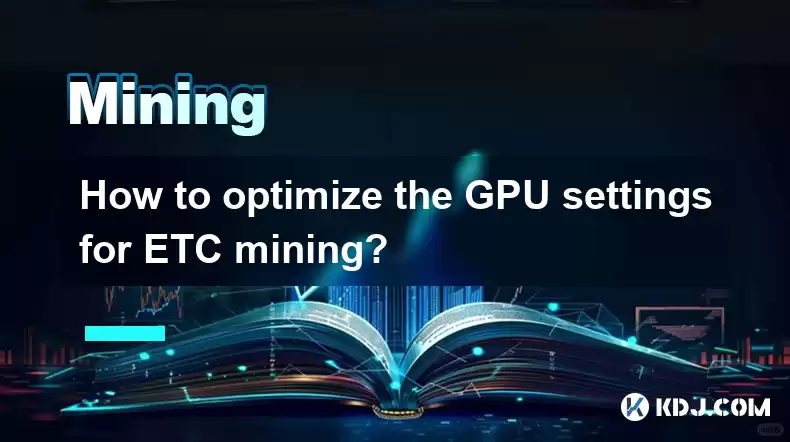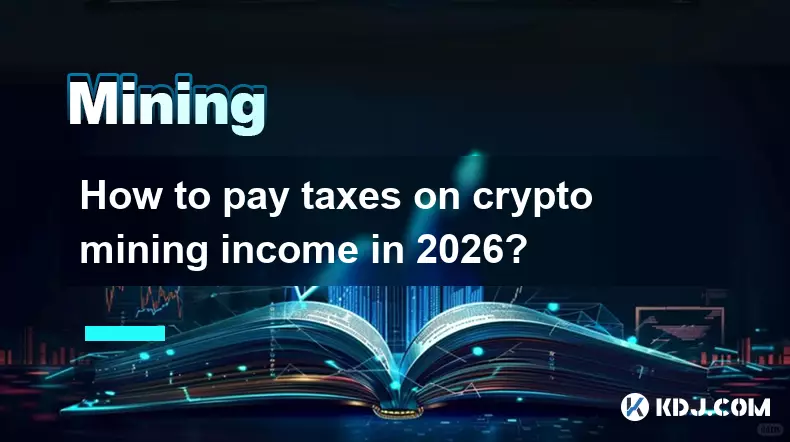-
 bitcoin
bitcoin $87959.907984 USD
1.34% -
 ethereum
ethereum $2920.497338 USD
3.04% -
 tether
tether $0.999775 USD
0.00% -
 xrp
xrp $2.237324 USD
8.12% -
 bnb
bnb $860.243768 USD
0.90% -
 solana
solana $138.089498 USD
5.43% -
 usd-coin
usd-coin $0.999807 USD
0.01% -
 tron
tron $0.272801 USD
-1.53% -
 dogecoin
dogecoin $0.150904 USD
2.96% -
 cardano
cardano $0.421635 USD
1.97% -
 hyperliquid
hyperliquid $32.152445 USD
2.23% -
 bitcoin-cash
bitcoin-cash $533.301069 USD
-1.94% -
 chainlink
chainlink $12.953417 USD
2.68% -
 unus-sed-leo
unus-sed-leo $9.535951 USD
0.73% -
 zcash
zcash $521.483386 USD
-2.87%
How to optimize the GPU settings for ETC mining?
Efficient ETC mining requires understanding your GPU, carefully overclocking (monitoring temps!), ensuring optimal cooling, using the right software, and managing power consumption for profitability.
Mar 11, 2025 at 11:05 pm

- Understanding your GPU's capabilities is crucial for efficient ETC mining. Different cards have different strengths and weaknesses.
- Overclocking can boost hashrate, but carries risks of instability and hardware damage. Proceed with caution and monitor temperatures closely.
- Efficient cooling is paramount to prevent overheating and maintain stable performance. Proper airflow and fan curves are essential.
- Software choices significantly impact mining efficiency. Selecting the right miner and configuring it properly is key.
- Power consumption is a major factor in profitability. Optimizing power settings can reduce electricity costs without significantly impacting hashrate.
Ethereum Classic (ETC) mining relies heavily on the performance of your Graphics Processing Unit (GPU). Optimizing your GPU settings is crucial for maximizing your mining profitability. This involves understanding your hardware, software, and the delicate balance between performance and stability.
Understanding Your GPUBefore diving into settings, identify your specific GPU model. Different cards have varying capabilities and optimal settings. Consult online resources specific to your card model for benchmarks and suggested overclocking parameters. Knowing your GPU's limitations is essential to prevent damage.
Overclocking Your GPUOverclocking involves increasing your GPU's clock speed and memory clock speed beyond the manufacturer's specifications. This can lead to a significant increase in hashrate, but it also increases the risk of instability and hardware damage. Start with small increments and monitor temperatures carefully. Use monitoring software to track your GPU's core and memory temperatures, as well as power draw.
- Incrementally increase clock speeds: Start with small increases (e.g., +50 MHz for core clock, +250 MHz for memory clock) and test for stability.
- Monitor temperatures: Use software like MSI Afterburner or HWInfo to monitor GPU temperature. If temperatures exceed 80°C (176°F), reduce the overclock.
- Adjust voltage (carefully): Increasing voltage can help with stability at higher clock speeds, but it also increases power consumption and heat. Only adjust voltage if absolutely necessary and with caution.
- Test for stability: Run a mining benchmark for at least 30 minutes to ensure stability at the new overclock settings. Frequent crashes indicate an unstable overclock.
Effective cooling is paramount for maintaining stable overclocks and preventing hardware damage. Overheating can drastically reduce performance and shorten the lifespan of your GPU.
- Ensure adequate airflow: Make sure your case has sufficient fans to provide adequate airflow to your GPU.
- Consider an aftermarket cooler: For high-end cards or aggressive overclocking, an aftermarket cooler can significantly improve cooling performance.
- Clean your system regularly: Dust buildup can impede airflow and reduce cooling efficiency.
- Monitor fan speeds: Adjust fan curves to maintain optimal temperatures without excessive noise.
The choice of mining software significantly impacts your mining efficiency. Different miners have varying levels of optimization for different GPUs and algorithms.
- Research popular miners: Popular ETC mining software options include TeamRedMiner, lolMiner, and others. Each has its own strengths and weaknesses.
- Configure the miner correctly: Ensure the miner is properly configured for your specific GPU and mining pool. Incorrect settings can lead to reduced hashrate or even connection issues.
- Update your software regularly: Regular updates often include performance improvements and bug fixes.
Power consumption directly impacts your mining profitability. Optimizing power settings can reduce electricity costs without drastically affecting hashrate.
- Power limit adjustment: Most GPUs allow you to set a power limit. Reducing the power limit can lower power consumption, but may also slightly reduce hashrate. Experiment to find the optimal balance.
- Monitor power draw: Use monitoring software to track your GPU's power consumption.
- Efficient power supply: Ensure your power supply is capable of handling the power demands of your mining rig. An underpowered supply can lead to instability and damage.
Q: What is the best GPU for ETC mining? A: There's no single "best" GPU. High-end cards from AMD and Nvidia generally perform well, but the optimal choice depends on your budget and power consumption considerations. Look for cards with high memory bandwidth.
Q: How can I monitor my GPU temperature while mining? A: Use monitoring software like MSI Afterburner, HWInfo, or similar tools. These programs display real-time GPU temperature, clock speeds, and other vital statistics.
Q: What happens if my GPU overheats? A: Overheating can lead to reduced performance, instability, and potentially permanent damage to your GPU. It's crucial to maintain adequate cooling.
Q: What are the risks of overclocking? A: Overclocking carries the risk of instability, crashes, and even hardware damage if not done carefully. Start slowly and monitor temperatures closely.
Q: How do I choose a mining pool? A: Choose a pool with a good reputation, low fees, and a consistent payout schedule. Research different pools and compare their performance before making a decision. Consider factors like pool size and hash rate distribution.
Disclaimer:info@kdj.com
The information provided is not trading advice. kdj.com does not assume any responsibility for any investments made based on the information provided in this article. Cryptocurrencies are highly volatile and it is highly recommended that you invest with caution after thorough research!
If you believe that the content used on this website infringes your copyright, please contact us immediately (info@kdj.com) and we will delete it promptly.
- Bitcoin's Tightrope Walk: Navigating Opportunity Amidst Bull Trap Fears
- 2026-02-09 10:30:01
- Super Bowl 2026 Coin Toss: The Big Bet That Failed, Proving 'Heads' Reigns Supreme
- 2026-02-09 10:25:01
- DeepSnitch AI Ignites Crypto Presale Frenzy with Potential 100x Gains Amidst Market Volatility
- 2026-02-09 06:40:01
- Big Game Kickoff: BetMGM Deals $1,500 Bonus for Coin Toss Betting Thrills
- 2026-02-09 07:15:01
- Bitcoin's Rollercoaster: Navigating FOMO, Opportunity, and the Ever-Present Trap
- 2026-02-09 07:10:01
- The Super Bowl Coin Toss: A Flip of Fate, A Bet of Billions, and the Enduring Allure of Heads or Tails
- 2026-02-09 07:10:01
Related knowledge

How to mine crypto sustainably in 2026?
Feb 07,2026 at 04:20pm
Energy Source Optimization1. Miners increasingly deploy solar arrays directly on warehouse rooftops to power ASIC rigs during daylight hours. 2. Geoth...

How to increase the hash rate on a Bitcoin miner?
Feb 09,2026 at 08:19am
Optimizing Hardware Configuration1. Ensure all ASIC chips are fully powered and operating within their specified voltage range. Undervolting below the...

How to mine Conflux on a standard gaming laptop?
Feb 07,2026 at 04:19am
Hardware Requirements for Conflux Mining1. Conflux uses a proof-of-work consensus mechanism called Tree-Graph, which is designed to be ASIC-resistant ...

How to buy hashing power on cloud mining platforms?
Feb 08,2026 at 05:59pm
Understanding Cloud Mining Contracts1. Cloud mining platforms offer users the ability to rent hashing power without owning or maintaining physical har...

How to mine Flux with a 30-series Nvidia GPU?
Feb 07,2026 at 02:40pm
Market Volatility Patterns1. Bitcoin price movements often exhibit sharp intraday swings exceeding 5% during low-liquidity windows, particularly betwe...

How to pay taxes on crypto mining income in 2026?
Feb 07,2026 at 01:20am
Tax Classification of Mining Rewards1. Cryptocurrency received as mining rewards is treated as ordinary income by most major tax jurisdictions includi...

How to mine crypto sustainably in 2026?
Feb 07,2026 at 04:20pm
Energy Source Optimization1. Miners increasingly deploy solar arrays directly on warehouse rooftops to power ASIC rigs during daylight hours. 2. Geoth...

How to increase the hash rate on a Bitcoin miner?
Feb 09,2026 at 08:19am
Optimizing Hardware Configuration1. Ensure all ASIC chips are fully powered and operating within their specified voltage range. Undervolting below the...

How to mine Conflux on a standard gaming laptop?
Feb 07,2026 at 04:19am
Hardware Requirements for Conflux Mining1. Conflux uses a proof-of-work consensus mechanism called Tree-Graph, which is designed to be ASIC-resistant ...

How to buy hashing power on cloud mining platforms?
Feb 08,2026 at 05:59pm
Understanding Cloud Mining Contracts1. Cloud mining platforms offer users the ability to rent hashing power without owning or maintaining physical har...

How to mine Flux with a 30-series Nvidia GPU?
Feb 07,2026 at 02:40pm
Market Volatility Patterns1. Bitcoin price movements often exhibit sharp intraday swings exceeding 5% during low-liquidity windows, particularly betwe...

How to pay taxes on crypto mining income in 2026?
Feb 07,2026 at 01:20am
Tax Classification of Mining Rewards1. Cryptocurrency received as mining rewards is treated as ordinary income by most major tax jurisdictions includi...
See all articles





















![Is This a REAL Reversal or Fake out?? I wouldn't Get Excited Just Yet... [20 Min emergency stream] Is This a REAL Reversal or Fake out?? I wouldn't Get Excited Just Yet... [20 Min emergency stream]](/uploads/2026/02/08/cryptocurrencies-news/videos/origin_698897450a654_image_500_375.webp)


![Mesocosmos (By Biskotos) [All Coins] | Geometry Dash Mesocosmos (By Biskotos) [All Coins] | Geometry Dash](/uploads/2026/02/08/cryptocurrencies-news/videos/origin_69889be2eac64_image_500_375.webp)

















































